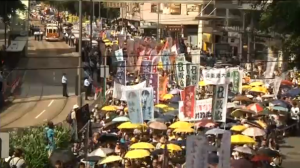
(Reuters) — Tens of thousands rallied for free elections in Hong Kong on Wednesday (July 1) as the city marks the 18th anniversary of its return to China.
The annual demonstration took place nearly two weeks after Hong Kong’s legislature vetoed a Beijing-backed electoral reform proposal that had triggered sometimes violent protests in the city, presenting Beijing with one of its most serious challenges in years.
Protest organizer and convener of the Civil Human Rights Front, Daisy Chan, said the city’s unpopular leader Leung Chun-ying should take responsibility for the reform’s failure and step down.
“I understand that CY Leung said that the current government will not restart the political reform. But I think CY Leung as the Chief Executive, he has the greatest responsibility of the voting down of the political reform. And thus we call him to step down immediately”, Chan said.
The July 1 protest took place some seven months after Hong Kong police forcibly cleared pro-democracy street protesters from occupying the main streets for 79 days.
Police cleared away the last few pro-democracy tents near government headquarters last week.
Many protesters carried symbols from the months-long civil disobedience movement, such as yellow umbrellas.
One protester with a yellow umbrella, 34-year-old primary school teacher Manki Chu, said a lot had changed in Hong Kong since the handover 18 years ago.
“I think everything changes subtly and you can’t even notice it. But by looking back in these 18 years, you found that there are great differences between 18 years ago and right now. And that’s why we come out and support Hong Kong, support our freedom,” Chu said.
Hong Kong returned to China under a “one country, two systems” formula that granted the city wide-ranging freedoms denied in mainland China.
Protester, 26-year-old Mok Ho-wa, said he thinks Beijing’s influence has since encroached so much into Hong Kong that the formula is practically dead.
“Honestly I don’t think we have ‘one country, two systems’ today. Instead it’s ‘one country, one system’ because of its policies. They play the national anthem on TV every day, it seems a bit like brainwashing to me. The government thinks Hong Kong people don’t love the country. It thinks apart from loving the country, you also have to love the Communist Party. But loving the country and loving the Party are two separate things,” Mok said.
China also held out the promise of universal suffrage. The electoral blueprint rejected by lawmakers last month would have allowed a direct vote for the city’s next chief executive in 2017, but only from among pre-screened, pro-Beijing candidates.







